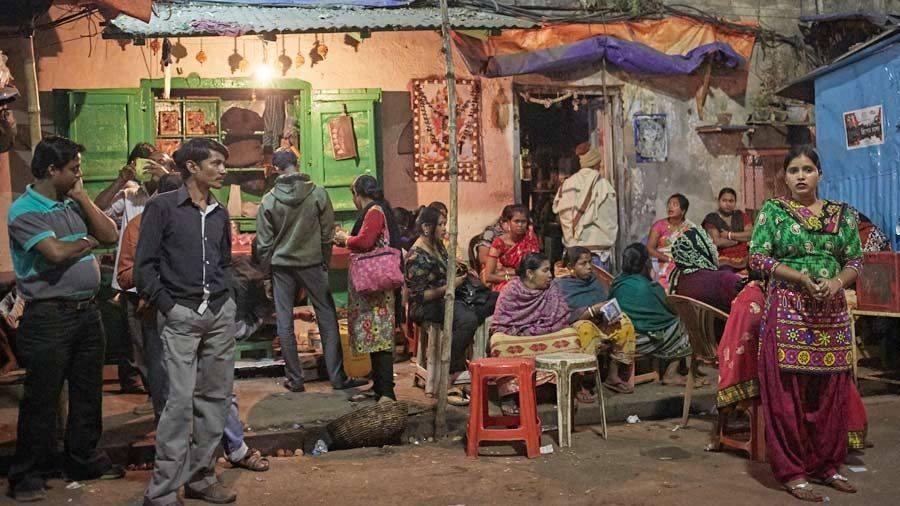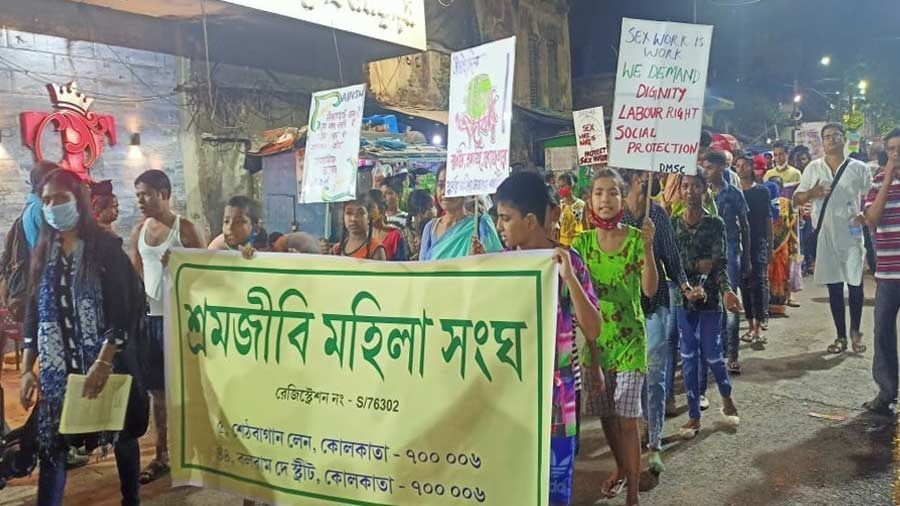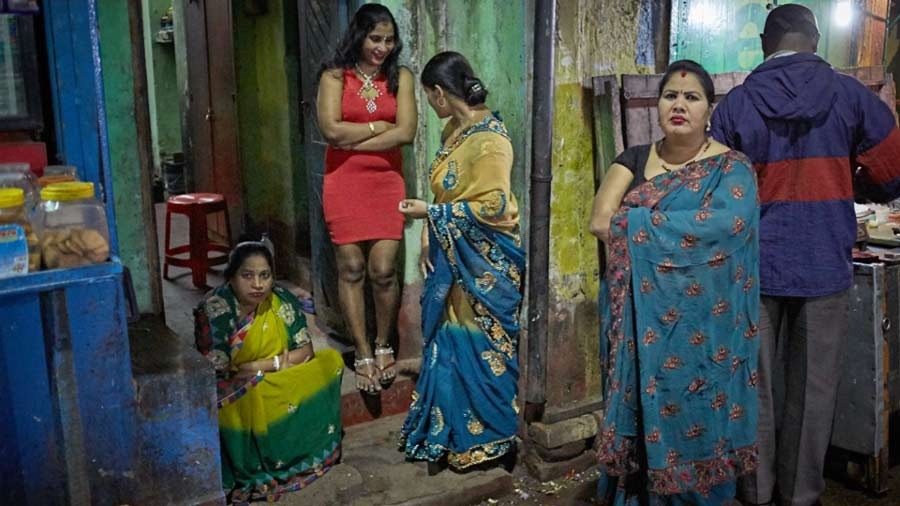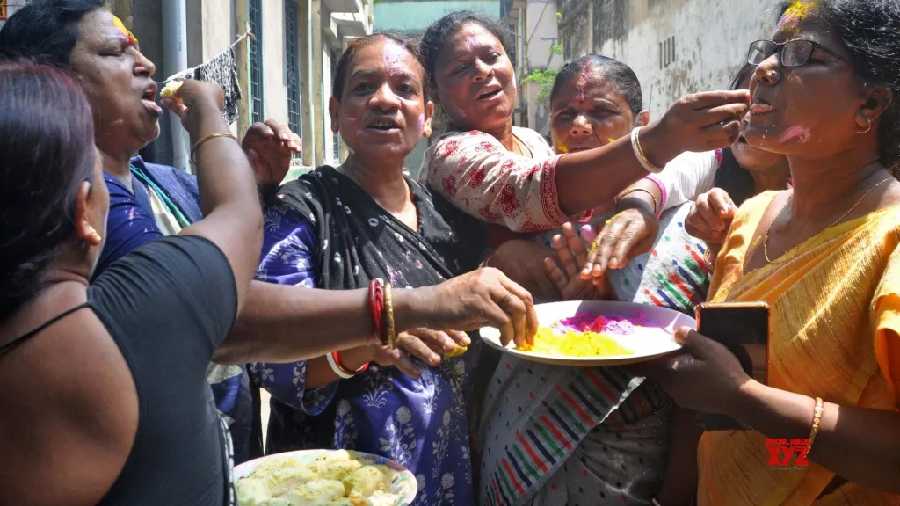My father is generally quite comfortable with me taking his car to work assignments. He refused for the first time, when I told him that I wanted to go to Sonagachi to cover a rally for sex workers’ rights. Being Asia’s largest red-light district, I doubt it had anything to do with traffic. Maybe trafficking.
Nevertheless, I took a bus and navigated a dozen tiny alleys to reach the rally. A minister was there, proudly claiming that his party had brought nirvana to sex workers’ lives. He stood at the forefront of the rally and got himself clicked. After walking barely five steps, the skies thundered, and it started raining. The minister saw it as an affirmation that the almighty would fulfill sex workers’ rights and excused himself from the proceedings.
Rakhi, one of the leaders of the rally’s trans community, nodded to me and said: “These people make promises just for votes. Our lives haven’t changed at all.” She didn’t say this with an ounce of self-pity. Rakhi turned out to be one of the most empowered people I have met. She caters to 10 clients a day, while maintaining a steady relationship with her boyfriend, and has set up her own home. “I was thrown out by my family for my sexuality. But this is their loss. Kya gunah kiya hijra hoke!” she exclaimed while clapping furiously.
The rain got worse and most people abandoned the rally. Rakhi ducked into a nearby house, while I tried taking cover under a shop. She beckoned me inside. I entered, to find that the building houses eight of the 8,000 sex workers in Sonagachi. I also realised that prostitution centres do not look like Sanjay Leela Bhansali sets. They look like Anurag Kashyap ones.

‘At Sonagachi, I also realised that prostitution centres do not look like Sanjay Leela Bhansali sets. They look like Anurag Kashyap ones’ Shutterstock
The yellow paint on the walls spelt more gloom than hope, but not complete hopelessness. The ladies were not caked with make-up and decked out in colourful saris. Some sported nighties and shabbily applied kajal, paired with a ‘couldn’t-care-less’ expression. Everything about the space echoed monotony. Even strange men bumbling in to do stranger things seemed routine. Contrary to popular perception, it felt less like a front for organised crime, and more like a corporate butcher shop where flesh was but another thing sold to make enough to support oneself.
Chai-break chit chat
I asked them if they would be willing to talk about their lives, expecting hostility, or at least reluctance. Instead, the women enthusiastically circled me, one of them even giving up her stool. It struck me how ordinary they considered their stories to be. “Humlog ke baare mein aap kya likhiyega? Kuch hai hi nahi batane ke liye,” chimed one.
Rakhi, though, was forthcoming. She told me how happy she was to provide for herself, without having to depend on her less-than-supportive family. One of the women, Simran, noticed Rakhi’s golden teeth and asked why she got them. Rakhi made a gesture indicating that oral sex broke her incisors. “But why golden?” asked Simran, fighting her giggles. “I thought it might help me hike my rates,” replied Rakhi. All the women burst out laughing. These women don’t see themselves as victims, nor do they want to be seen as such. They see sex work, and sex itself, as something that provides for them. Something both humane and humorous.

A poster in front of the Supreme Court TT archives
The laughter tapered off when an elderly woman came out of one of the rooms. She strolled into the circle and shot me a questioning look. I felt fear, induced in some measure by Bollywood’s depiction of the unrelenting ‘maalkin’. Simran nodded to her and she walked back inside. “After 40, women stop getting customers. Those who are lucky and have savings move out to start afresh. Others like her end up staying here, bittering away,” she whispered.
These women’s conversations didn’t feel any different from the chai breaks employees steal between work in corporate offices. They ranted about annoying clients and discussed their respective performances. However, every time I forgot where I was, one of their stories brought me back to reality.
Reality bites
Swati was a 14-year-old girl from a village in Andhra Pradesh when she was married off to an older man. Her husband would get drunk and beat her up. He would take away the money that she earned through backbreaking labour to feed their two children. When she couldn’t take it any more, she ran away with her infant daughter, leaving her son behind with her husband. “I couldn’t find work after leaving my town, so I came to Sonagachi,” she lamented. Swati is 22. A year younger than me.
Her conviction belied her age. “I work here to pay for my daughter’s education and to give her good food and clothes. She stays with my masi during the day and I bring her here when I’m done with my clients at night.” Swati knows Tamil, Telugu, Bengali, Hindi and English, but it is the language of maternal love that spoke the loudest. Beaming, she showed me a picture of her daughter on her phone. “I want to save enough money to leave this work and give her a good life.”

“Some people don’t respect us. They tend to think that they have bought us by paying for our services. They expect us to do things we don’t want to. Sometimes I have to, because otherwise, who will look after my child?”
Her resolve doesn’t make things easier. “Some people don’t respect us. They tend to think that they have bought us by paying for our services. They expect us to do things we don’t want to. Sometimes I have to, because otherwise, who will look after my child?”
I hesitantly asked if customers ever got violent. “Pehle hota tha. Ab band ho gaya,” said Simran. Intrigued, I asked: “Maarna kaise band ho gaya?” She replied: “Kyuki ab yahan ladki log bhi maarti hai!” Simran elaborated that if a customer misbehaves with one woman, everyone comes together to administer a royal thrashing. This extends beyond just dealing with violent customers; the beatings also help establish boundaries around acts they aren’t comfortable with. “A customer who was clearly high on bhaang wanted to kiss me, but I was firm that I do not kiss customers. He tightened his grip on my hands and tried to force me. I kicked him hard between his legs and he doubled over. I opened the door and called in three more girls to bash him up. We have tremendous unity,” she smiled, to raucous cheers.
Freedom at a price
These women have been able to take control of their narrative by doing away with the pimp or bhadwa system. “Earlier, the maalkin used to take away most of our money, leaving us with peanuts. Ever since we have done away with the owner system in our building, we have complete rights over our income. We don’t even need to work during our periods!” said Simran. She proudly showed me her gleaming iPhone, bought with her own money last month.
The changes have not only reduced the cases of violence, but also allowed women to turn away drunk customers. The women regulate the number of clients they want to entertain every day. While Rakhi doesn’t mind accommodating 10 people, Swati draws the line at four. Simran has the freedom to take a holiday when she wants.
The Durbar Mahila Samanwaya Committee has been campaigning for the rights of sex workers since the 1990s and has successfully brought about awareness regarding STDs, conducting free STD tests every few months. The women also vehemently oppose unprotected sex and using condoms has become mandatory in their building in the past few years. Their conviction around contraception is something I haven’t seen among educated urban youths.

Children of sex workers march at a rally
Their freedom comes at a price. Rs 400 for 15 minutes, to be precise. “15 minutes?” I exclaimed, despite myself. Simran chuckled: “Ladka log ko isse zyada time lagta hai kya?” She added that their rates are lower than the rates in pimp-run buildings, where prices can go up to Rs 3,200. Due to pressure from pimps and high prices, the women there have virtually no rights, and have to do everything their clients want.
While much has been done, the women continue to face a mountain of challenges every day. “Rapes have reduced, but we still hear of a case every few days. Recently, a nine-year-old was raped by her father. They often do this to kids who are left here by their families and can’t be sent back,” said Simran.

“Rapes have reduced, but we still hear of a case every few days. Recently, a nine-year-old was raped by her father. They often do this to kids who are left here by their families and can’t be sent back”
She hasn’t had an easy life either. Growing up in Kathmandu, Simran spent her childhood in poverty, with her mother, who used to sell vegetables. She came to Sonagachi to support her family. While she lost her mother to cancer last year, Simran’s work ensured that her family didn’t have to deal with financial pressure.
Survival instinct
It’s uncanny that we see sex workers as malicious, when their actions are governed by the most primal instinct: survival. I asked them if their life has any room for romance. Simran bluntly replied “If someone gives me money, he is my boyfriend”, to widespread laughter. She added, more earnestly: “We are humans, too, so sometimes we do get attached. Most people come to satisfy their hunger for sex. But once in a while, a man listens to our problems and understands us. Nice people even leave a tip.” A third woman described the phenomenon poetically. Pointing to her chest, she said: “Kuch ladke aashiq hote hai, idhar se.” She moved her hand to her crotch and said: “Baaki sab idhar se!”
And yet, they told me about their romances with glittering eyes. About the men who walked in and exchanged not just bodily fluids, but “dil aur dosti ki baatein”. A lot of love is shared, but the tipping point always seems to be their identity. “The men are our boyfriends till the border of Sonagachi, beyond which they go back to their other lives. They come here to receive love, but won’t be seen in the outer world with us,” said Simran.

“The men are our boyfriends till the border of Sonagachi, beyond which they go back to their other lives. They come here to receive love, but won’t be seen in the outer world with us”
The conversation around female pleasure, too, seems yet to be had. When I asked if customers only took pleasure without giving any, they stared blankly. I then tried to ask, as discreetly as I could, if they ever orgasmed. Upon realising what I meant, they shrugged their shoulders and said in unison “Humko koi farak nahi padta”, in a tone that indicated that their pleasure didn’t matter.
Perhaps because of this, the women of Sonagachi have become a family. They have nicknames for each other in the building, such as Lauki, Aloo, Strawberry and Honey. Their conversations showed that they don’t really care for intimacy from their customers, as they have forged the most intimate bonds among themselves.
This, however, isn’t a substitute for happiness. “Of course we all want to leave. Would you like it if you had to have sex with 10 different people every day? They treat your body like a canvas, where only they get to paint, without caring about you. No matter how nice customers are, there are so many times we just don’t feel like doing it. We still have to, to feed ourselves,” sighed Simran. I asked her how she felt about the way society sees sex workers. She pondered silently for a bit and replied: “Sonagachi hai isliye ghar ka ladki log surakshit hai. Society calls us prostitute, sex worker, r***i. We don’t give these names to ourselves. Humlog toh bas insaan hai, aapke jaise.”
Outside influence
While we were having this conversation inside, Sarita was sitting under the arch near the building’s entrance, scrolling through comedy reels on Facebook and occasionally eyeing prospective customers. She got up when I asked the women about happiness and said firmly: “Zindagi mein kaun khush hai? Ameer paisa kamake bhi khush nahi, aur garib khudse ghar chalake bhi nahi. Zindagi kuch bhi nahi, Zandu balm hai, lagate raho.”
At 8pm, I realised that we had been talking for almost an hour, without a single customer coming in. Sarita attributed it to the rain. “Aap Eid ya Durga Puja mein aaiye.” At first, I thought she was referring to a local celebration. She gleefully laughed and said: “Itne customer hote hai ki pair rakhne ki jagah nahi hoti.”
The women’s earnings crashed during the pandemic, when a majority of them went back to their villages. “No one in our villages knows that we work here. If they knew, they would have thrown us out.” Sarita returned recently, only to find the dhanda in a shamble. How did they sustain themselves then? “After a point, you make friends with old customers. During Covid, some of these customers gave us money, say between Rs 2,000 and Rs 5,000, without asking for our services, just to help.”

Workers’ earnings crashed during the pandemic, when a majority of them went back to their villages Shutterstock
This is in contrast to what a local shopkeeper told me, indicating that the problem started way before Covid. “Demonetisation ke pehle yahan ladkiyon ka bazaar lagta tha. Ab logon ke paas khaali note nahi hai deneko, toh inka dhandha bhi band ho gaya hai, aur ye log chori bhi karne lage hai.” He said he would easily sell over 100 condoms every day a few years ago. That day, his tally stood at two.
And yet, there are those who linger at the buildings daily even today. Simran told me that many people want to act out their most repressed fetishes. This added a layer not just to the sex workers, but their customers. Maybe, these are the only people and Sonagachi the only place where these ‘customers’ get to be themselves, without judgement. Maybe they come for more than sex.
At this point, a middle-aged man walked in, closing his umbrella. He was drenched, but broke into a warm smile upon seeing Simran. She whispered, “Old customer” and returned his smile. There was a noticeable spring in both their steps as they walked up the long staircase and disappeared into one of the rooms, shutting the door behind them.
